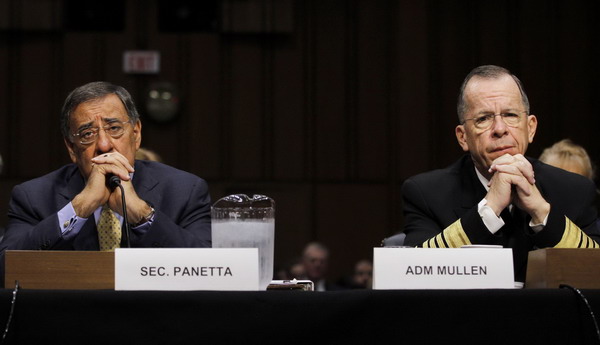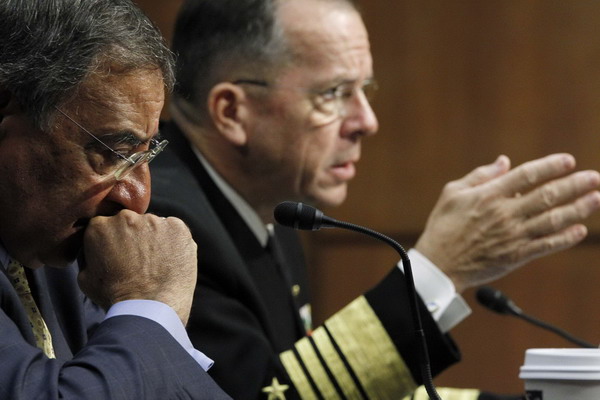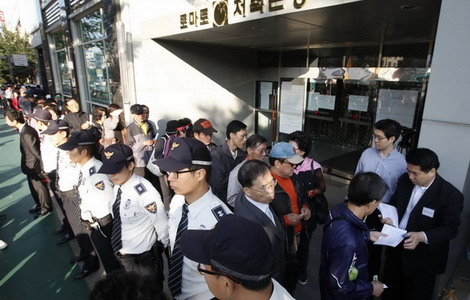US says won't ignore Iran-backed attacks in Iraq
Updated: 2011-09-23 10:28
(Xinhua)
|
|||||||||||
|
 US Defense Secretary Leon Panetta (L) and Chairman of the Joint Chiefs of Staff Admiral Mike Mullen attend a Senate Armed Services Committee hearing on Capitol Hill in Washington Sept 22, 2011. [Photo/Agencies]
|
WASHINGTON - The United States will not "sit idly by" while its forces are harmed by Iranian-backed militias in Iraq, the top US military officer, Admiral Mike Mullen, said on Thursday.
Mullen and US Defense Secretary Leon Panetta told a Senate committee that while such attacks by groups linked to Iran had declined since the summer, the United States would not ignore it the attacks recurred.
"They (the Iranians) have been warned about continuing it ... that if they keep killing our troops, that will not be something we will sit idly by and watch," Mullen told the Senate Armed Services Committee.
"Iran needs to understand that we're going to be around awhile here, making very clear to them that we're not - we're not simply going to ignore what Iran is doing in - in Iraq," Panetta said.
Fourteen US services members were killed in hostile incidents in Iraq in June. Most of the deaths were attributed by US officials to rocket attacks by Shi'ite militias armed by Iran.
Mullen and Panetta said that the attacks stopped after a combination of military and diplomatic engagement with Tehran by Baghdad.
But they suggested the potential for such attacks remained. Mullen said Iran has shipped weapons to Shi'ite militias operating in Iraq, including roadside bombs called EFPs (explosively formed projectiles) and rocket-propelled munitions known as IRAMs (improvised rocket-assisted munitions).
"They're shipping EFPs and IRAMs. And the IRAMs are getting bigger and bigger. And so, there is a great downside potential for destabilizing particularly southern Iraq, that actually I think Prime Minister Malaki and the Iraqi leadership is concerned about," Mullen said.
The US military is scheduled to fully withdraw its remaining troops - numbering about 40,000 - from Iraq by Dec 31, although Iraqi politicians are trying to decide whether to ask Washington to leave some troops beyond 2011 to continue to train their army and police forces.
Mullen said the Obama administration would consult with Congress about the matter once it had a decision from Baghdad. "But we're - honestly, we're just not there yet. We'd be having, from my perspective, circular conversations about this, because we just don't know what's going on in Baghdad," he said.
|
 US Defense Secretary Leon Panetta (L) and Chairman of the Joint Chiefs of Staff Admiral Mike Mullen attend a Senate Armed Services Committee hearing on Capitol Hill in Washington Sept 22, 2011. [Photo/Agencies]
|
Defense cut
US Defense Secretary Leon Panetta said on Thursday that the department will make decisions on defense budget cuts strategically, with an eye on both current and future military needs.
Testifying before the Senate Armed Services Committee, Panetta said that the Pentagon has been undergoing a strategy-driven process to implement the savings targets required by the debt ceiling agreement.
"While this review is ongoing and no specific decisions have been made at this point, I'm determined to make these decisions strategically," he said, stressing that the Pentagon will take into consideration not only the military's current needs, but also what it takes to prepare for the future.
Panetta called for a balanced approach to achieve savings, vowing to "look at all areas" including procurement practices and compensation area.
The remarks came as the Pentagon is struggling to meet the savings targets outlined in the debt ceiling deal. The law ordered 350 billion dollars of baseline defense cuts in 10 years, which the Pentagon said it is prepared to implement. But the deal also included a sequestration mechanism which could cut defense budgets by additional 500 billion dollars in a decade if a bipartisan penal fails to provide a proposal of further spending cuts or the Congress fails to approve that proposal.
Defense officials have been lobbying hard against the sequestration mechanism, saying it would undermine the military's ability and vital national interests.
Related Stories
Two US men convicted as spies leave Iran 2011-09-22 06:33
Iran develops own version of Russian S-300 2011-09-21 09:45
Iran ups criticism of Turkey over NATO missile shield 2011-09-18 19:34
US drops Israeli company from Iran sanctions list 2011-09-14 07:56
Iran, Russia sign nuclear co-op protocol 2011-09-13 08:57
Iran's first nuclear power plant connected to grid 2011-09-04 19:42
Hot Topics
Libya conflict, Gaddafi, Oil spill, Palace Museum scandal, Inflation, Japan's new PM, Trapped miners, Mooncake tax, Weekly photos, Hurricane Irene
Editor's Picks

|

|

|

|

|

|







